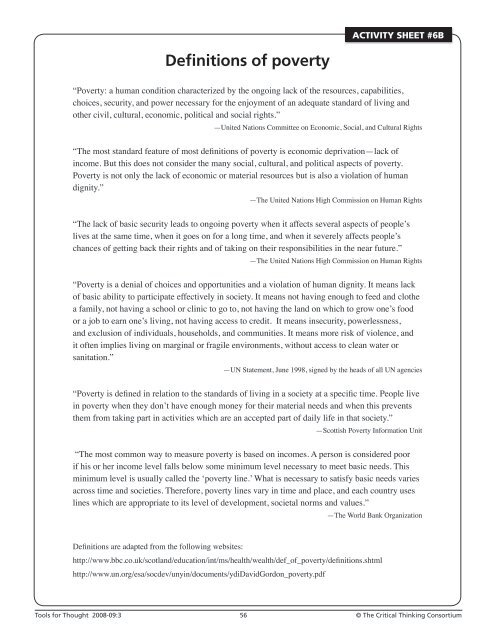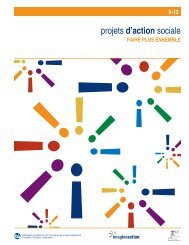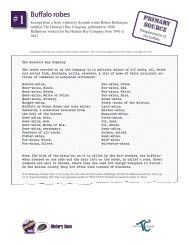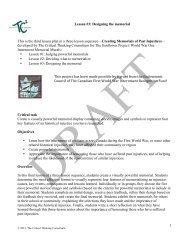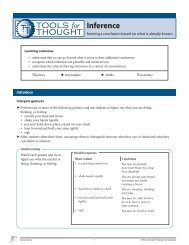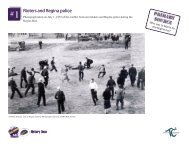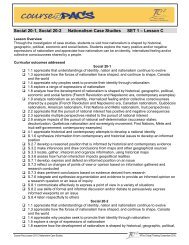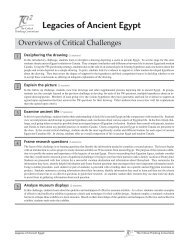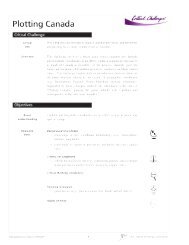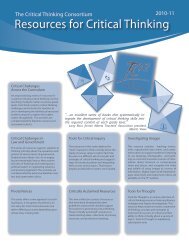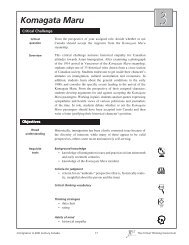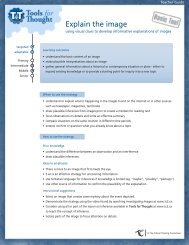Inquiry-mindedness - The Critical Thinking Consortium
Inquiry-mindedness - The Critical Thinking Consortium
Inquiry-mindedness - The Critical Thinking Consortium
You also want an ePaper? Increase the reach of your titles
YUMPU automatically turns print PDFs into web optimized ePapers that Google loves.
ACTIVITY SHEET #6BDefinitions of poverty“Poverty: a human condition characterized by the ongoing lack of the resources, capabilities,choices, security, and power necessary for the enjoyment of an adequate standard of living andother civil, cultural, economic, political and social rights.”—United Nations Committee on Economic, Social, and Cultural Rights“<strong>The</strong> most standard feature of most definitions of poverty is economic deprivation—lack ofincome. But this does not consider the many social, cultural, and political aspects of poverty.Poverty is not only the lack of economic or material resources but is also a violation of humandignity.”—<strong>The</strong> United Nations High Commission on Human Rights“<strong>The</strong> lack of basic security leads to ongoing poverty when it affects several aspects of people’slives at the same time, when it goes on for a long time, and when it severely affects people’schances of getting back their rights and of taking on their responsibilities in the near future.”—<strong>The</strong> United Nations High Commission on Human Rights“Poverty is a denial of choices and opportunities and a violation of human dignity. It means lackof basic ability to participate effectively in society. It means not having enough to feed and clothea family, not having a school or clinic to go to, not having the land on which to grow one’s foodor a job to earn one’s living, not having access to credit. It means insecurity, powerlessness,and exclusion of individuals, households, and communities. It means more risk of violence, andit often implies living on marginal or fragile environments, without access to clean water orsanitation.”—UN Statement, June 1998, signed by the heads of all UN agencies“Poverty is defined in relation to the standards of living in a society at a specific time. People livein poverty when they don’t have enough money for their material needs and when this preventsthem from taking part in activities which are an accepted part of daily life in that society.”—Scottish Poverty Information Unit“<strong>The</strong> most common way to measure poverty is based on incomes. A person is considered poorif his or her income level falls below some minimum level necessary to meet basic needs. Thisminimum level is usually called the ‘poverty line.’ What is necessary to satisfy basic needs variesacross time and societies. <strong>The</strong>refore, poverty lines vary in time and place, and each country useslines which are appropriate to its level of development, societal norms and values.”—<strong>The</strong> World Bank OrganizationDefinitions are adapted from the following websites:http://www.bbc.co.uk/scotland/education/int/ms/health/wealth/def_of_poverty/definitions.shtmlhttp://www.un.org/esa/socdev/unyin/documents/ydiDavidGordon_poverty.pdfTools for Thought 2008-09:3 56 © <strong>The</strong> <strong>Critical</strong> <strong>Thinking</strong> <strong>Consortium</strong>


